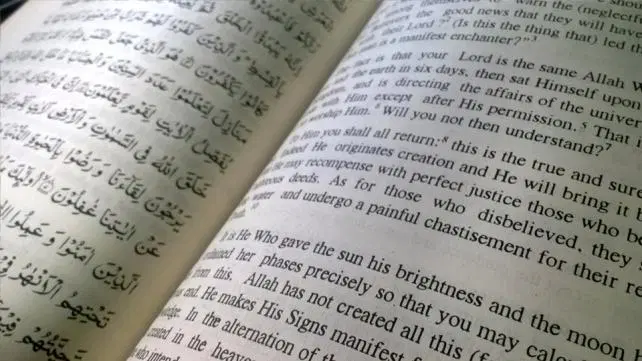Quran Translations
Quran Translation In English – Quran Translation In Urdu
Every Muslim desires to understand the intricate language and nuances of the Qur’an. However, more than four out of every five Muslims in the world come from non-Arab backgrounds and do not speak Arabic, the language in which the Qur’an was revealed. Accordingly, the majority of Muslims, as well as interested non-Muslims, who wish to understand the Qur’an have to do so through translations in their native languages. In this article, we will consider some of the features of a number of popular translations of the Qur’an in English, which make them suitable for different kinds of readers.
DOWNLOAD THE QURAN WITH ENGLISH TRANSLATION (PDF)
WAY TO PERFORM ISTIKHARA:
Salat-al-Istikhara is a petition of direction presented during times of hesitation. To perform Istikhara, you should initially be purified, so perform Wudu if essential. Open your petition, discuss two rak’ah, at that point offer your
Istikhara supplication. As opposed to hanging tight for a phenomenal, representative vision, you ought to reflect inside to discover answers and look for counsel from those you discover shrewd and learned. While asking, show truthfulness, abstain from asking or arguing, and be prepared to finish on the appropriate responses you get.
1. Perform Ablution or Wudu. Prior to beginning supplication, you ought to perform Wudu to guarantee you’re perfect. Focus your musings, at that point wash and flush these regions multiple times: your hands, mouth, face, nose, and lower arms. Wash your head and ears once, at that point wash your feet multiple times (beginning with the privilege foot).
You would then be able to point your correct pointer to the sky and discuss a supplication of witness: “Debris hadu al laa ilaaha illALLAHu wahdahuu laa shariikalahu, wa debris hadu anna Muhammadan ‘abduhuu wa rasuuluh.”
The English interpretation is, “I give testimony there is no god other than Allah alone; He is One; He has no accomplice and I take the stand Muhammad (Peace arrive) is His (picked) worker and (genuine) Messenger.”
Sometimes, you may need to perform Ghusl rather, for example, when semen is radiated, or after intercourse.
Set up your space for petition. Ensure your space is spotless enough to be reasonable for petition. Spot a tangle onto the floor to guarantee neatness. Position the tangle so it (and you) face the Qibla, or Mecca.
2. Open your supplications. Start by fixating yourself on your expectation. Lift your hands to your ears while standing and state, “Allah Akbar,” which means “Allah is the Greatest,” to open your supplications. At that point present the Isteftah Dua, or opening petition, trailed by the Ta’awwuz and Tasmiah.
The Isteftah Dua is: “Subhana Kal-lah murmur mama wabi hamdika wata-baara kasmuka wata’ala jad-duka wala ilaha ghyruk.” This makes an interpretation of to, “Wonder be to you, O Allah, and all commendations are expected unto you, and favored is your name and high is your grandness and none is deserving of love yet you.”
The transliteration of the Ta’awwuz is, “A’udhu bil-lahi minash Shayta-nir-rajeem,” which makes an interpretation of in English to, “I look for Allah’s assurance from Satan who is damned.” You just need to discuss Ta’awwuz once.
The transliteration of the Tasmiah is, “Bismillah hir-Rahma nir-Raheem,” which means, “for the sake of Allah, the most Kind and the most Merciful.” You ought to present Tasmiah before each Surah, or part of the Quran, that you discuss.
3. Discuss the Surah Fatiha. Before offering the Salat-al-Istikhara, present two rak’ah (supplication cycles), beginning with the Surah Fatiha. Make sure to begin each Surah by saying, “Bismillah hir-Rahma nir-Raheem.” [2]
The Surah Fatiha is presented in each rak’ah. Its transliteration is:
Alhamdul lil-lahi rab-bil ‘alameen
Ar rahma nir-raheem
Maliki yawmid-deen
Iyyaka na’budu wa iyyaka nasta’een
Ihdinas siratal mustaqeem
Siratal Lazeena an’amta ‘alayhim
Ghai-ril maghdubi ‘alayhim
Walad dal-leen. Ameen.
In English, this means:
Commendation is just for Allah, Lord of the Universe.
The most Kind, the most Merciful.
The ace of the Day of Judgment.
Only you we adore and to only you we petition God for help.
Show us the straight way,
The method for those whom you have favored.
Who have not merited your resentment,
Nor wandered off-track.
4. Present the Surah al-Kafirun. After the Surah Fatiha, proceed with your two rak’ah recitations with the Surah al-Kafirun, or section 109 of the Quran. Make certain to begin each Surah by saying, “Bismillah hir-Rahma nir-Raheem.”
5. Recount the Surah Fatiha again then the Surah al-Ikhlas. State the Surah Fatiha by and by, at that point discuss the Surah al-Ikhlas. Start with Tasmiah, or “Bismillah hir-Rahma nir-Raheem.”
6. Rehash the petition the same number of times and for the same number of days as you want. You may decide to rehash the Istikhara supplication or keep discussing the same number of rak’ah as you want. Keep on consolidating Istikhara into your every day supplications until you have discovered goals. Have a go at performing it for seven days, however stop on the off chance that you believe you have been offered a response between that time.


